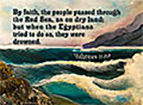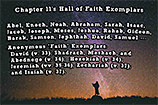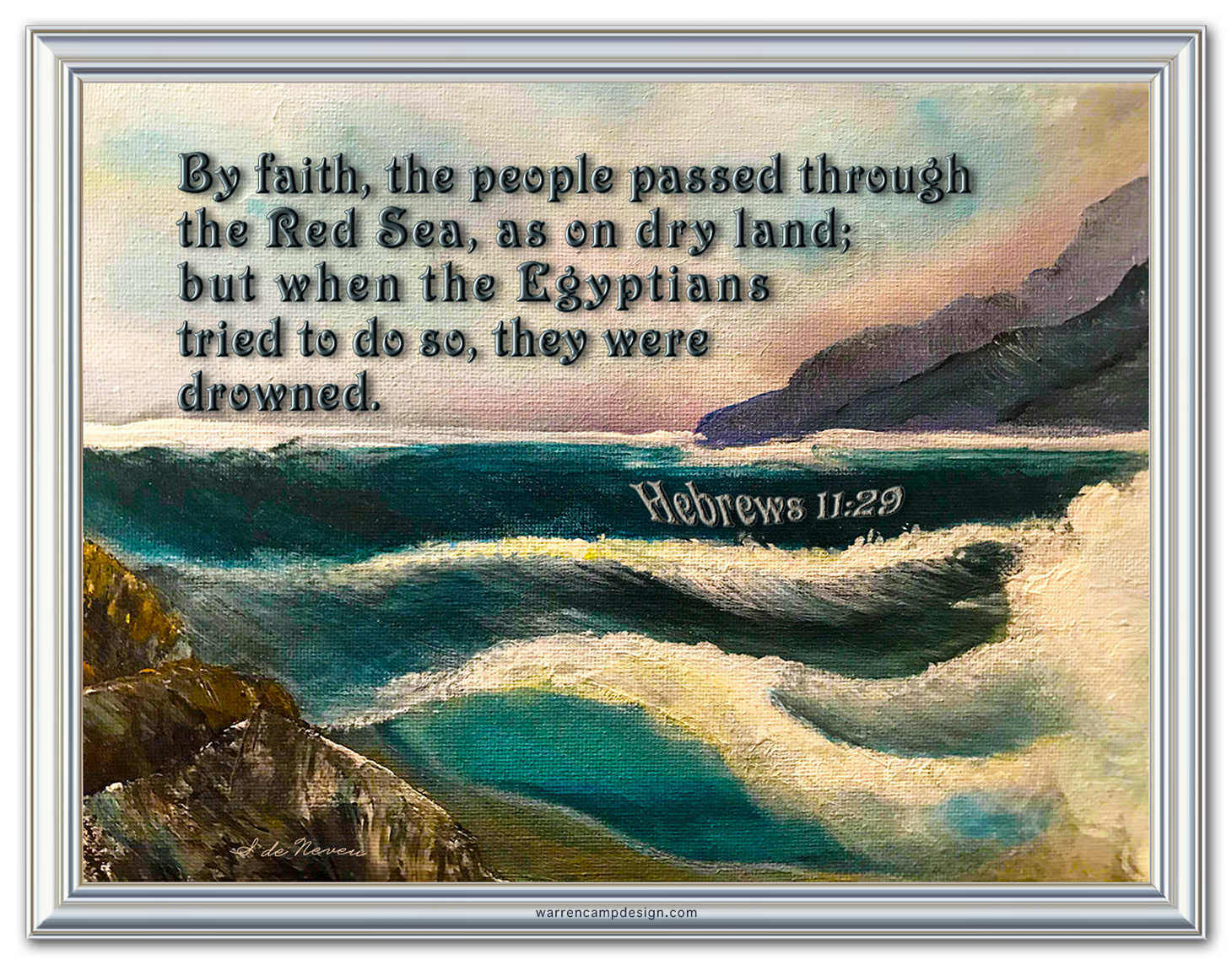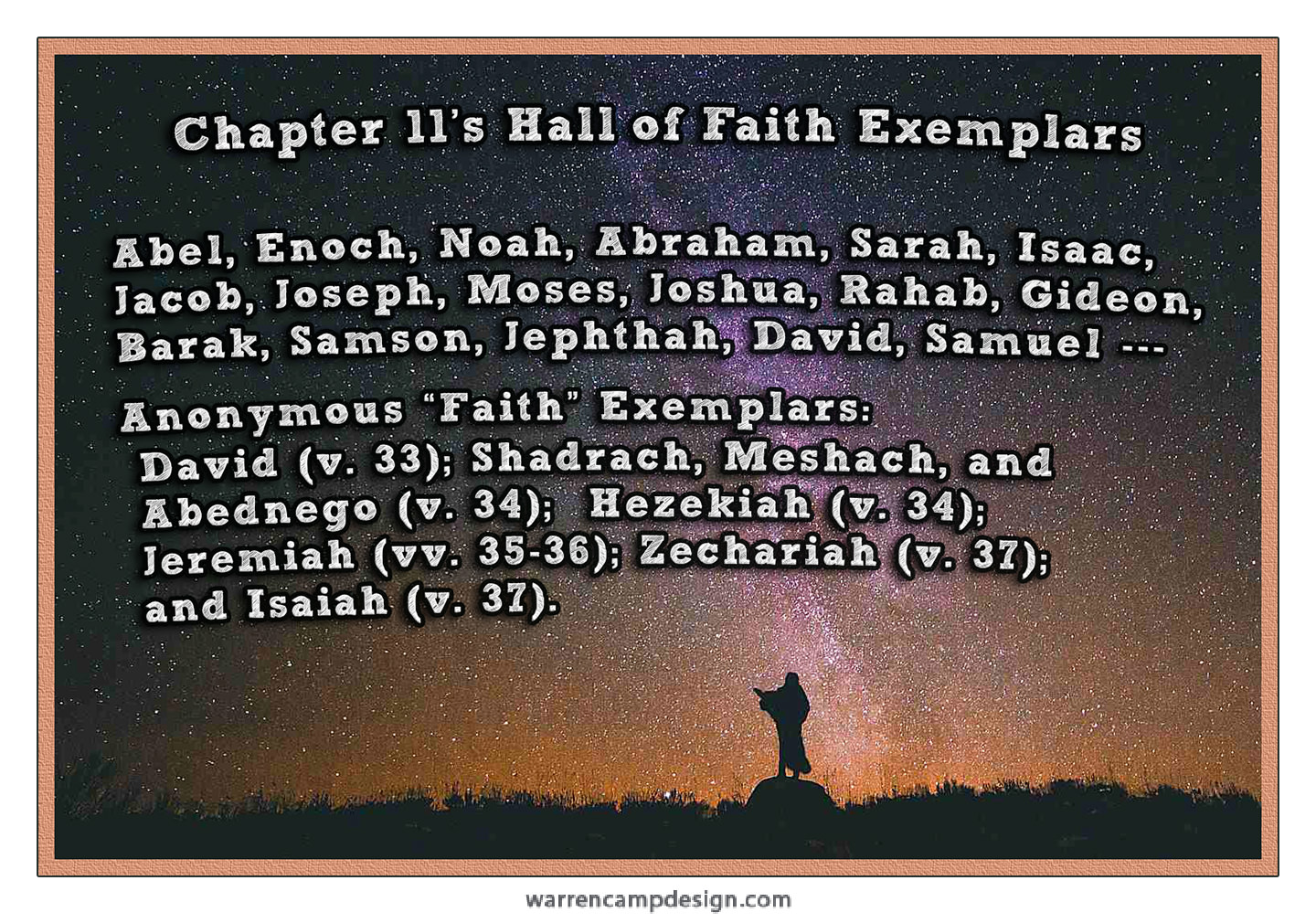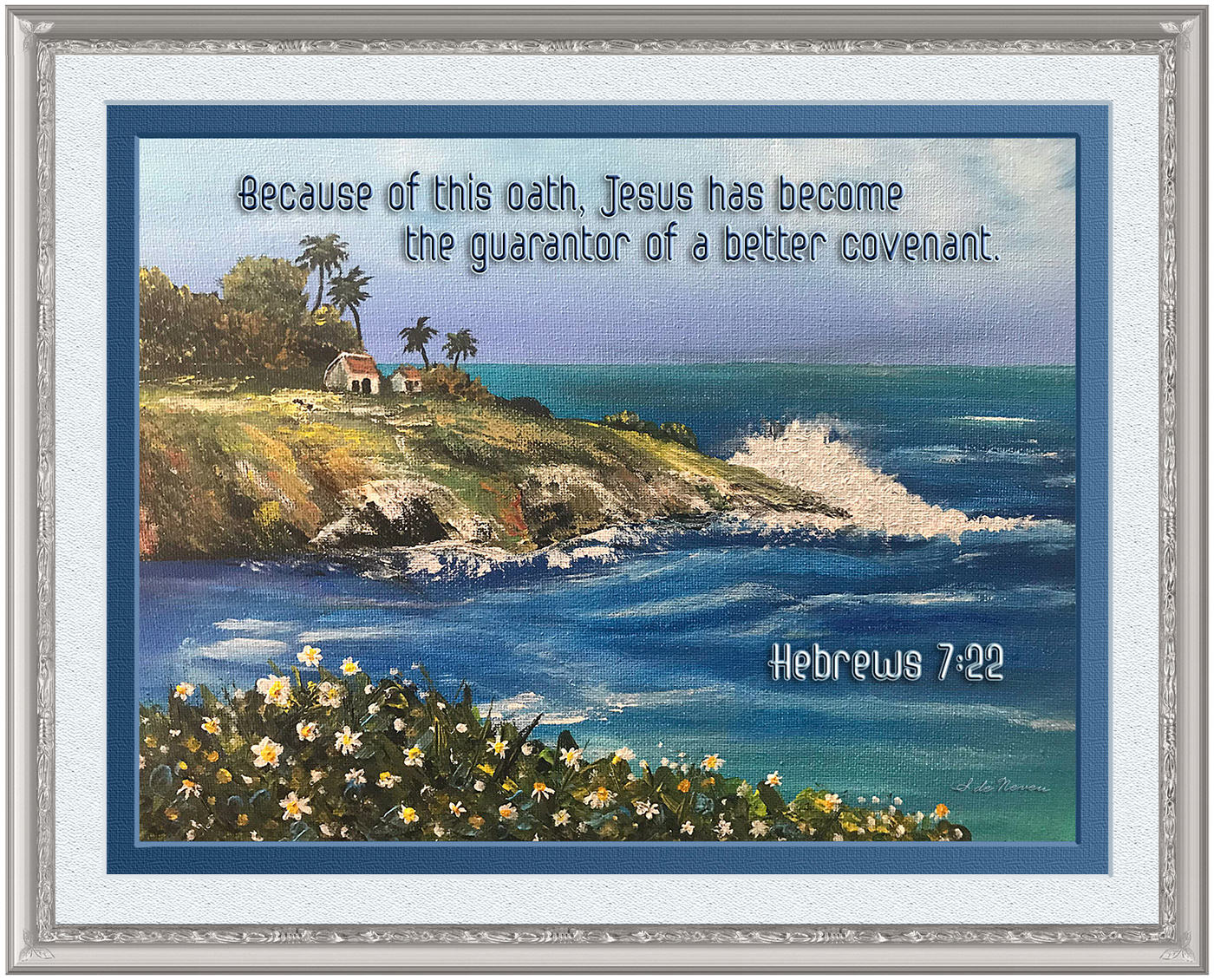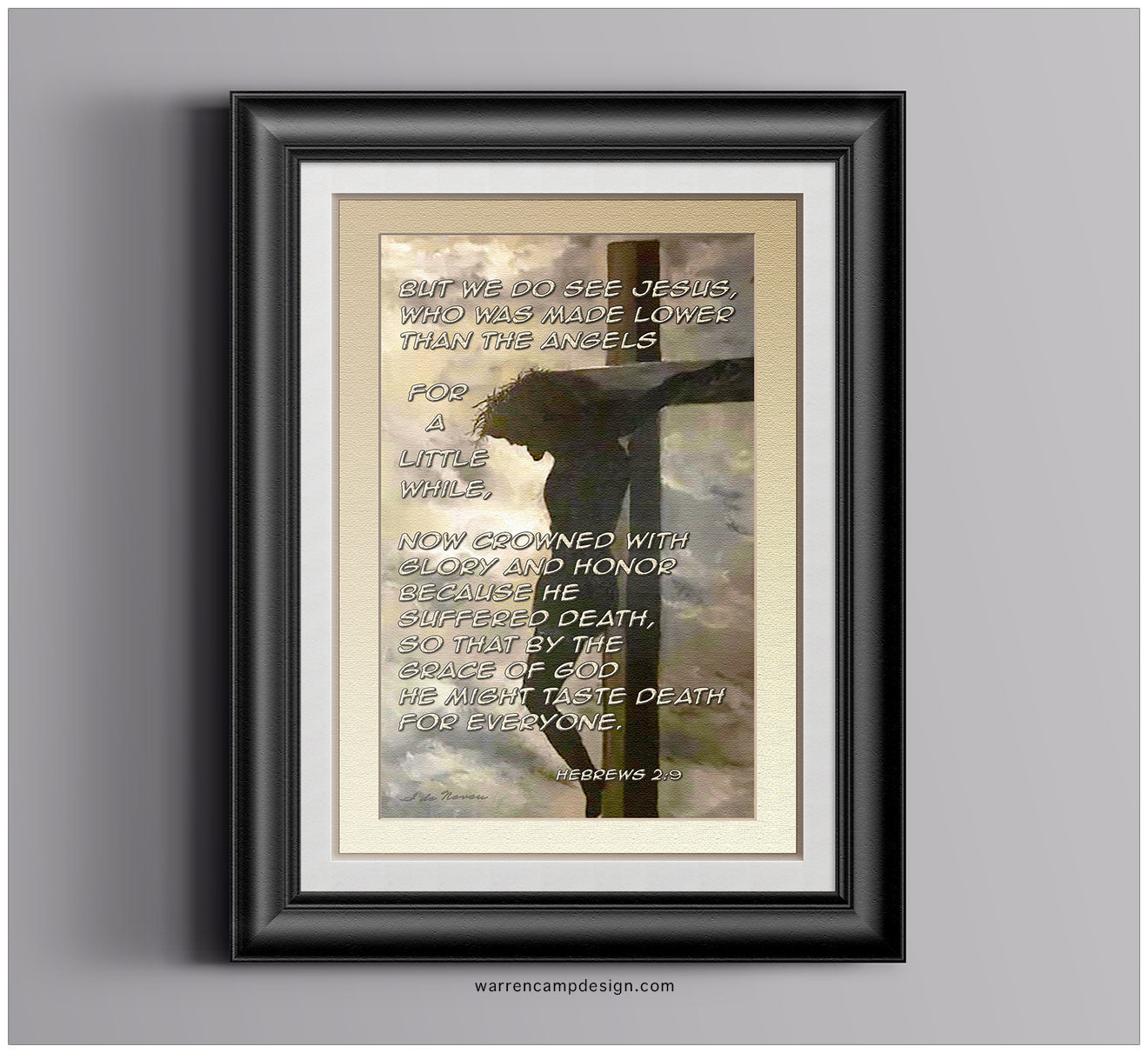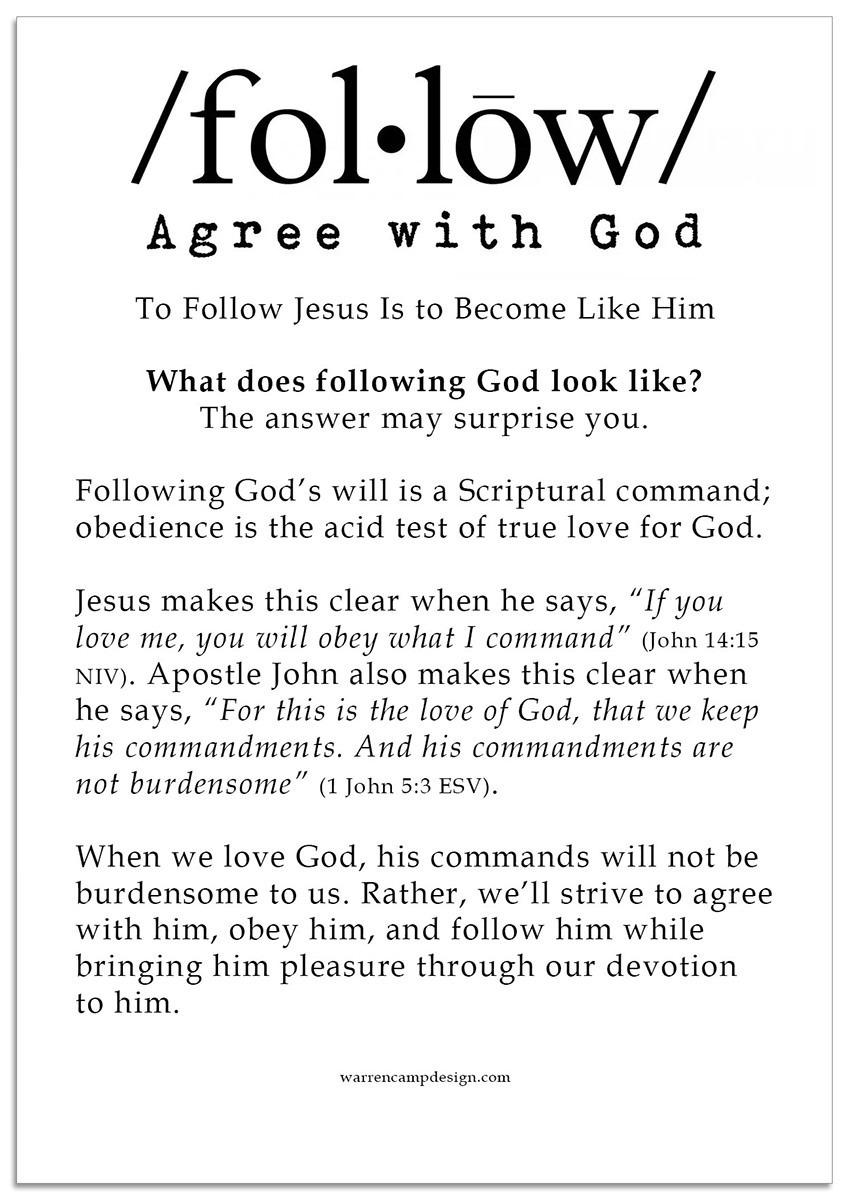The “Hebrews” Epistle —
“Summary, Closing Comments, and Questions”
by Warren Camp
From the beginning of this epistle or letter to Jewish Christians, we've been shown that many first-century Jews wavered in their faith, refusing to accept the good news they'd heard about Jesus. They were undervaluing their privileges in Christ while engaging in discouragement. Most importantly, numbers of them were in danger of giving up their faith (5:11–12); they'd started well (6:10) but didn't progress (6:11). The author of "Hebrews" attempted to lead them from an elementary knowledge to a mature grasp. So when many refused to see and believe that Jesus was Messiah, he exhorted them to be loyal to Christ, showing them Jesus' superiority.
Wanting to keep these wavering Jewish believers in Christ from drifting back into their traditional ceremonies and rituals, they were urged to let go of everything and hold fast their faith and hope in the gospel. It happened that those strict Jewish Christians, who before believing in and following Jesus Christ, had devotedly followed the old covenant's rules, regulations, and rituals. They had difficulty giving up all of that for something brand new — Christ's new covenant. The author couldn't tolerate their old-covenant attraction, compliance, and behavior. He stressed throughout his letter to them that it was by faith alone that a person could be perfected and saved; one had to faithfully and fully put his or her trust in Jesus.
It's worth noting one fact above others: that within this letter, Jesus is prominent on every page! He's greater than prophets (1:1–3); angels (1:4–2:18); Moses (3:1–19); Joshua (4:1–16); and Aaron (5:1–10:18). The reason the author used these comparisons is that each held a place of great importance in rabbinical Judaism. Being the framework of Jewish worship, it had to be proved that some thing or some One "better" or "superior" had to appear, albeit as a great high priest, if followers were to transfer their allegiance to a new plan or covenant.
The Person of Christ is Superior (1:1–4:15)
In Rome, these Jewish Christians and a collection of non-Jewish Gentile believers struggled under Nero’s persecution. Many of the early Jewish believers in Jesus had been backsliding to the old ways by prioritizing and adhering to the practices, rites, and rituals of Judaism, in order to escape mounting persecution. Because some believers were considering moving back toward Mosaic Law, the writer showed these Jewish Christians that, although they faced suffering, they were certainly following a better way and ought to continue to make such life-changing efforts. This letter was written especially for them with that purpose.
Today, as our Great High Priest, Jesus is able to understand our needs because he is perfect Man. He's able to "empathize with our weaknesses" because he "has been tempted in every way, just as we are — yet he did not sin" (4:15). He's also able to meet all our needs because he is perfect God.
This letter effectively compares "the old covenant that God had made with the Jewish nation" with "the new covenant made with all people, through the life, death, and resurrection of Jesus." How much better and more essential to Christian living, then and today, is the new covenant. Remember, this letter was written to correct the erroneous idea that Jewish believers in Jesus had lost some things because they'd adopted Christianity. This letter sought to remove that misconception. Christianity isn't "giving something up"; instead it's "receiving" the greatest gifts of life.
In his old-versus-new comparison, the author starts by contrasting Jesus' superiority to angels, Moses, Melchizedek, the Law, the Aaronic priesthood, and many others. He basically argues that all of these individuals and instruments of the Old Testament and its practices point directly to Christ Jesus who fulfills them all, is greater than all of them, and casts his shadow on all of these great biblical figures. There's no doubt that Moses, Melchizedek, and Aaron were superb leaders; however, Jesus is far more significant and consequential because he's not simply one of God's servants, he's Father God's one and only Son.
In the days of Old Testament religious regulations and rituals, the high priest approached God on behalf of the people, praying for them and their needs. He offered up the peoples' animal sacrifices regularly in an attempt to cleanse the people from their wrong and sinful actions. But Jesus had become, and was seen by many, as a much-more effective, far superior high priest: the Great High Priest of all time (4:14–15).
Highly esteemed by the Israelites, the gold-covered ark of the [old] covenant was intentionally located inside the Most Holy Place of the earthly tabernacle's tent. The ark symbolized for them God's presence, power, and potential. However, that inner Holy of Holies chamber, which only the high priest could enter, and that only once a year and never without blood, was separated from the two other chambers (the Holy Place and the outer court), by a thick curtain or veil.
The existence of curtains in the Old Testament's earthly tabernacle, separating man from both holy places, was symbolic of how the old covenant represented barriers that kept the Israelites apart from God. This sets up a comparison (9:14–15), showing how Christ's sacrifice successfully performed true salvation, once for all, while it also achieved the perfection of our relationship with God. All three synoptic gospels report that, when Jesus died on the cross, the curtain of Jerusalem's temple — that barrier between the Holy Place and Most Holy Place — was supernaturally torn in two (see Matthew 27:51; Mark 15:38; and Luke 23:45). This split curtain symbolized that, in "the new order," animals' blood would no longer be needed. Thankfully, a personal way to God had been openly revealed to everyone; today, God is available to all, through Christ's death.
Two Great Warnings (Warning 1) Don't neglect the great salvation that is offered to us, not by angels, but by Lord Jesus; listen to what the Son has to tell you (2:1–4)… (Warning 2) Don't turn away from the living God; make sure to have a believing heart while developing the habit of mutual encouragement (3:12–13).
The Priesthood of Christ is Superior (4:14–10:18)
"Now the main point of what we are saying is this: We do have such a high priest" (8:1a). Christ has been compared herein with many, but the most important comparison is with Aaron, the high priest. The writer demonstrated that the priesthood of Christ is superior to the priesthood of Levitical Law.
The central points of "Hebrews" are (1) Christ's eternal priesthood and (2) his sacrifice that provided forgiveness of the world's sin. This epistle dwells upon the supreme importance and power of Christ's blood in obtaining, once, for all, everyone's redemption. Clearly, the former Levitical priesthood was unable to bring things to perfection for the people: It couldn't justify their guilt, sanctify them from inward pollution, or cleanse worshipers' consciences from their sinful acts. And it was unable to draw man near to God. At best, it set boundaries that kept man from getting too close to God, otherwise dying as a result.
But Christ's priesthood introduced to the people a better hope built on a true foundation from God providing his complete pardon leading to our salvation; our new Great High Priest tends to work in us a stronger, more active hope in our acceptance of him. Through such hope we're warmly invited to get close and personally engage with Father God by entering and abiding into a covenant-union with him. He allowed Jesus to forfeit his life as the perfect sacrifice of all time. His death can make people completely clean in God's eyes.
Christ himself is a priest; he's also a Great High Priest forever, after the order of the eternal Melchizedek priesthood. Aaronic priests couldn't make people perfect because they themselves were sinful. But Christ is eternal and sinless. He isn't weak and full of failure, as the high priests had been. Nor does he grow old or ever die as they had. Christ Jesus remains alive forever! He's always ready and eager to help and strengthen his children. Having lived on earth for decades, he knows very well what it's like to be human. He therefore remains gentle and sympathetic to us.
Note the epistle's focus on three great "betters" regarding what Great High Priest Jesus offers: (1) a better covenant (7:22; 8:13) because it's based on better oaths and promises, all of which are written on the heart, not on stone tablets (8:10); a better tabernacle (9:1–12) because, while the tabernacle tent was only earthly, and its high priest entered the Holy of Holies only once a year, Christ officiates in his heavenly sanctuary, "once for all"; and (3) a better sacrifice (10:18) because Jesus himself is that sacrifice, offering himself as an unblemished perfect sacrificial lamb, remembering our sins and lawless acts no more so that he fully and finally cleanses us.
So how can we effectively approach God today? Christ has made that possible by being our High Priest, our personal representative of God Almighty. Jesus has entered the heavenly sanctuary, sitting with God and bearing the blood of his own sacrifice to cleanse us from our sins and give us the gift of eternal salvation. His blood had to be shed because "without the shedding of blood there is no forgiveness" (9:22). "But when this priest had offered for all time, one sacrifice for sins, he sat down at the right hand of God" (10:12). When all of Jesus' redemptive work had been completed, on the cross he said, "It is finished" (John 19:30); immediately the earthly tabernacle's separation curtain or veil was torn open from top to bottom (Matt. 27:51), putting an end to that temple and its religious system.
In a sense, the veil was symbolic of Christ himself, being the only way to the Father (John 14:6 ESV). We see in Heb. 10:19–25 the image of Jesus’ flesh being torn for us, just as he'd torn the veil for us. The earthly tabernacle's items were shadows of things to come, all of which ultimately point us to Jesus Christ. He represented the veil to the Holy of Holies. Through his death the faithful have been given free access to God, with Christ being our superior High Priest in heaven. As believers in his finished work, we partake of his superior priesthood. Being personally invited by him to enter heaven's Holy of Holies through him, we're blessed to be able to approach him with confidence and boldness (4:14–16).
Right now, our Great High Priest sits at Father God's right hand, interceding on behalf of faithful believers (7:25; 8:1; 10:12). He's gone "to appear for us in God's presence" (9:24), enabling us to confidently enter the holiest of heaven's realms "by a new and living way opened for us through the curtain, that is, his body" (10:19–20). So, don't hesitate to avail yourself of this glorious privilege.
The Life in Christ is Superior (10:19–13:25)
The closing chapters of "Hebrews" present the kind of life we're to live, thanks to Christ's work for us as High Priest. We see that he's at Father God's right hand, living to continually intercede on our behalf. Chapter 11 lists many Old Testament heroes and heroines, all of whom had fully trusted Father God, despite the darkness and doom they faced. Many eagerly looked forward to receiving the rich rewards that God had in store for them. Christians today can now enjoy receiving God's rewards, so long as an active, working faith is maintained.
Thanks to these many exemplars of faith, we ought to feel confident, albeit compelled to follow Jesus wholeheartedly and enthusiastically. Let us "pay the most careful attention, therefore, to what we have heard, so that we do not drift away" (2:1). May we be stimulated to continually worship Christ Jesus intimately and devotedly. Allow this three-verse passage that immediately follows chapter 11's famous Hall of Faith account to be your daily motivation.
12 1Therefore, since we are surrounded by such a great cloud of witnesses, let us throw off everything that hinders and the sin that so easily entangles. And let us run with perseverance the race marked out for us, 2fixing our eyes on Jesus, the pioneer and perfecter of faith. For the joy set before him he endured the cross, scorning its shame, and sat down at the right hand of the throne of God. 3Consider him who endured such opposition from sinners, so that you will not grow weary and lose heart (12:1–3).
There's nothing mysterious about "faith"; it's simply a willful act; we'll either believe in God or we won't. But when we decide to believe God absolutely, his supernatural power and life enter our lives. We're assured in 11:33–34 that, "through faith . . . weakness was turned to strength." The secret of Christian living is to faithfully allow Christ to strengthen us and meet our needs. "Faith" amounts to trusting God by believing in him wholeheartedly.
Are you now living and working as an inductee of the Hall of Faith? To live amid Hall of Faith exemplars requires two things that chapter 12 highlights: (1) We must, like anyone entering a race, "throw off everything that hinders" by yielding everything to Christ — "surrender" (12:1); (2) we also must believe that Jesus is trustworthy, for when we "fix our eyes on Jesus," we'll have given up the sin of unbelief that so easily oppresses us (v. 2). To succeed in both efforts, we must have patience, endure discipline (v. 11), live as a peacemaker to everyone (v. 14), and always see Jesus as the Perfecter of our faith (v. 2).
For our lives to be well-pleasing in the Lord's sight, we must fix our eyes on him, work faithfully for him, and become a Hall of Faith witness of him. In closing, please accept this faith-filled benediction. . .
20Now may the God of peace, who through the blood of the eternal covenant brought back from the dead our Lord Jesus, that great Shepherd of the sheep, 21equip you with everything good for doing his will, and may he work in us what is pleasing to him, through Jesus Christ, to whom be glory for ever and ever. Amen (12:20–21).
- Q. 1 What do you learn about faith when you read Moses' examples highlighted in 11:24–28?
- Q. 2 What physical, emotional, psychological price was paid to achieve the great results presented in vv. 29–30?
- Q. 3 How has your life changed as a result of your faith in God?
Hebrews 11:20–31
New International Version (NIV) or view it in a different version by clicking here.
— Listen to chapter 11, narrated by Max McLean.




